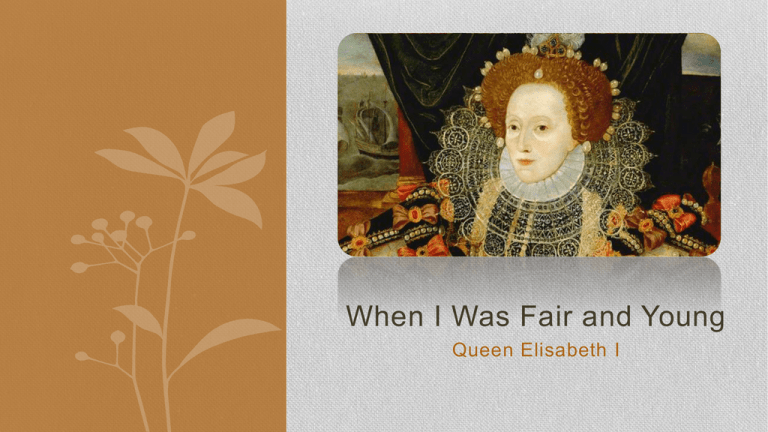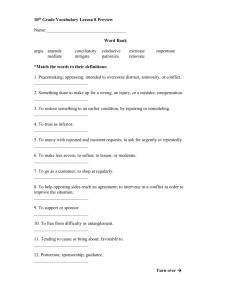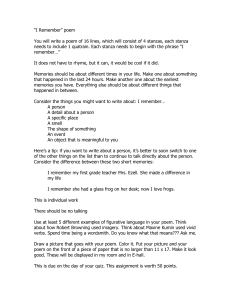File - AS LITERATURE
advertisement

When I Was Fair and Young Queen Elisabeth I Background information Queen Elisabeth was known as The Virgin Queen because of her decision to remain single for (most likely) political reasons. If she wed a foreign dignitary, she would upset the delicate balance of alliances among European states and probably precipitate a war. Regardless, she used the prospect of marriage to manipulate her nobles at home and the foreign princes abroad. On several occasions she managed to forestall a war by seeming to contemplate marriage with a relative of some particularly belligerent prince. Elisabeth may have also feared the loss of independence that would come with marriage, even to a queen. She is said to have remarked that she would have but one mistress and no master. Summary and Theme The speaker in the poem is an older woman reflecting on her rejection of suitors during her youth. Credited to Queen Elisabeth I, the poem reflects her choice to remain the “Virgin Queen.” The poem reflects the “folly” of her choice for she spends her later years alone. One possible theme of the poem focuses on the arrogant decisions of her past and how those choices affect the quality of her old age. References to her lost beauty also reflect a possible theme about the passage of time. www.brittanica.com/AlexiaSinclair When I was fair and young, then favor graced me. Of many was I sought their mistress for to be. But I did scorn them all and answered them therefore: ‘Go, go, go, seek some other where; importune me no more.’ How many weeping eyes I made to pine in woe, How many sighing hearts I have not skill to show, But I the prouder grew and still this spake therefore: ‘Go, go, go, seek some other where, importune me no more.’ Then spake fair Venus’ son, that proud victorious boy, Saying: You dainty dame, for that you be so coy, I will so pluck your plumes as you shall say no more: ‘Go, go, go, seek some other where, importune me no more.’ As soon as he had said, such change grew in my breast That neither night nor day I could take any rest. Wherefore I did repent that I had said before: ‘Go, go, go, seek some other where, importune me no more.’ http://www.youtube.com/watch?v=zlHYPrt7Tko Structure The poem is constructed of four stanzas that use a rather simple vocabulary. The syntax follows a succinct declarative structure. Each stanza utilizes parallelism and a refrain (“Go, go, go…no more”) that reflects her regret. The poem is also written in a series of couplets that reflect her impatient attitude. Poem is in first person, which lends an air of truth to the content. Graphicsfairy.blogspot.com “Fair” refers to beauty. The inverted syntax places emphasis on the “many” she “scorned,” which adds an arrogant tone to the poem. When I was fair and young, then favor graced me. Of many was I sought their mistress for to be. But I did scorn them all and answered them therefore: ‘Go, go, go, seek some other where; importune me no more.’ The refrain highlights the change in the speaker’s attitude, as well as her youthful arrogance. “Importune” means to demand with urgency, thus adding to the arrogant tone of the stanza. Diction is also important with the negative connotation of the word “scorn.” Anaphora creates parallelism that stresses the arrogance with which she rejected suitors. Inverted syntax appears in first two lines of this stanza to highlight the arrogance of her youth. A lack of emotion is demonstrated through the masculine rhyme of the first couplet. How many weeping eyes I made to pine in woe, How many sighing hearts I have not skill to show, But I the prouder grew and still this spake therefore: ‘Go, go, go, seek some other where, importune me no more.’ Synecdoche breaks down past suitors into body parts thereby demonstrating her lack of empathy for them. Her youthful arrogance saw only “eyes” and “hearts,” not a whole person. Shift in attitude begins with “Then.” Allusion to Cupid, the symbol of love, is used to destroy her youth and beauty. Alliteration of “d” suggests her vulnerability as Cupid “plucks” her beauty. The alliterative “p” stresses the end of her beauty, whereas the reference to “plumes” may also reference a peacock, a symbol of Immortality in the era. Then spake fair Venus’ son, that proud victorious boy, Saying: You dainty dame, for that you be so coy, I will so pluck your plumes as you shall say no more: ‘Go, go, go, seek some other where, importune me no more.’ As soon as he had said, such change grew in my breast That neither night nor day I could take any rest. Wherefore I did repent that I had said before: ‘Go, go, go, seek some other where, importune me no more.’ Just like the first stanza, the second and third lines use inverted syntax, this time to stress the speaker’s awareness of and discontent with her youthful actions. Because of her epiphany, the final use of the refrain changes in tone to resignation and regret. Works Cited http://aspoetryanalysis.weebly.com/index.html http://www.poetryfoundation.org/bio/queen-elizabeth-i http://www.slate.com/articles/arts/poem/2011/01/poets_under_pressure.html







